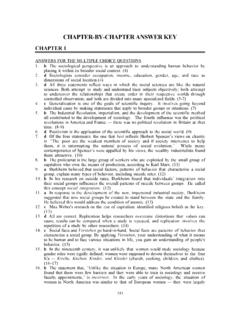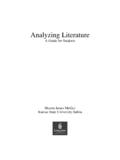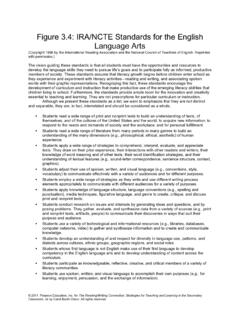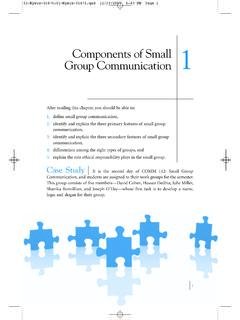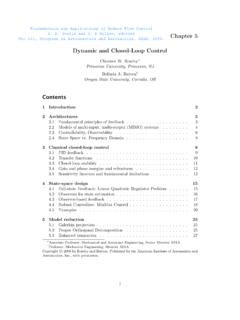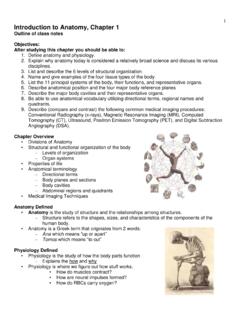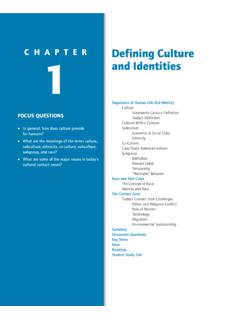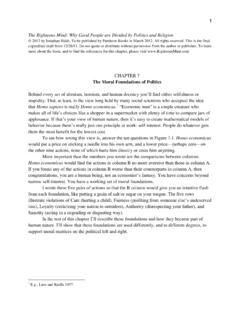Transcription of CHAPTER ONE What is Politics
1 1 CHAPTER ONEWhat is Politics ? CHAPTER OVERVIEWThis initial CHAPTER introduces and defines Politics and applies it toAmerica's government. In Lasswell's famous definition, Politics is "theprocess of who gets what, when, and how." In other words, the text'sdefinition of Politics "centers on actions among a number of peopleinvolving influence (note the opening example of the student-professorclassroom interaction).The concepts of power (the ability to influence another's behavior), elites(those who get more than others of the values society has available),legitimacy (the acceptance of something as right), and authority (alegitimate, efficient form of power) are discussed. The means by whichdemocratic Politics chooses conciliation rather than violence to maintainorder and adapt to change, as well as the fact that widespread participationthough freely-elected representatives is the cornerstone of everydemocracy, is also responsibilities of government are investigated; in particular, the needfor government as a means of controlling conflict (disputes overdistributions of a society's valued things), making rules determining whogets the valued things of society, and regulating the use of "legitimateforce.
2 " A condition of anarchy, or a society without government, is shownto be science, a discipline that studies the power-authority interactionamong people, is then distinguished from the other social sciences, such aseconomics or history, by looking at Microsoft as an arena for thesedifferent approaches. Political scientists would look at how Bill Gates andhis executives make decisions, the impact of the government's antitrust2suit against Microsoft, how the computer giant maintains its businesspreeminence, and how/why its leaders maintain power and authority. Inshort, to quote Lasswell once again, Politics "is the study of influence andthe influential."The author illustrates the life and death consequences of the political game with the example of the FAA's failure to regulate a door problemon the DC-10.
3 Political considerations resulted in needed safetymodifications for cargo doors being delayed by McDonnell Douglas, theDC-10's manufacturer. The result was a cargo door blowing off on aTurkish-owned DC-10 in1974, resulting in the deaths of 346 people onboard. The author concludes this section by explaining the organization ofsubsequent chapters and the reasons why we should all give a damn about the "complex, ever changing, never ending, and serious" game ofpolitics. In short, he says,"from the moment we wake up in the morning,we are affected by someone's political choices."LEARNING OBJECTIVESA fter reading CHAPTER 1, the student should be able " Politics " and explain why it is so important in Americansociety. Be sure to analyze the Lasswell definitions. Also, analyze the political significance of the "Guess Who's Coming to Dinner?
4 " boxed insert, especially from the perspective of "equality." the significance of power, authority, and political , explain why power was "limited" regarding SaddamHussein's removal from power in the reasons why government is necessary, as well as itstwo key functions. Also, how and why does government in the protect the private distribution of most of society's values andsimultaneously set limits on that private distribution? Explain howgovernment "alone" regulates the use of legitimate Understand how democratic Politics differs from rival approaches andwhat is meant by representative democracy. Also, explain how Politics in a democracy behaves like a what political scientists study from what other disciplines--history, economics, or psychology--study. In addition, summarizehow political scientists would study the serious and complex nature of the "political game" and understand how and why Politics affects the individual's life in somany how Politics was a "life and death" affair in the case of theFAA, McDonnell Douglas, and the DC-10 cargo door is Politics ?
5 -- The First Day of example. A very familiar illustration of how people get and use influence. Representative of Lasswell's classicdefinition of Politics as "the process of who gets what, when, and how." and Defined. Power is the ability to influence another'sbehavior. A distinction is made between the capacity for power( , a large military) and the ability to apply it ( , theAmerican problem with Saddam Hussein in Iraq). Power isgenerally a means to other ends; a method to acquire values,such as that wield power. The elite is defined as that group which has most of the resources (both material andnonmaterial) that society values. The unequal distribution ofwealth in America is used as an example and is supported withstatistics. For example, the top 1 percent of the population owns33 percent of the wealth.
6 Elites may differ according to thevalue considered (wealth, respect, etc.), but generally possessionof one value leads to control of other : Legitimate Power. Authority is defined as legitimatepower--it includes not only legal obligations, but alsopsychological and moral ones. Most people feel they shouldobey an authority; therefore, the need for force is minimized,making authority an efficient form of power. See Guess Who sComing to Dinner? Need for Government? Government is necessary to settle inevitable conflicts over the distribution of valued things. Governmentitself often becomes a potential threat, and its enormous powermust be controlled. The American system of constitutional,representative, democratic government recognizes this need tolimit government. Democracy chooses conciliation rather thanviolence, , no group is viewed as having a monopoly on is Government?
7 Government does three things:1. It makes the rules determining who gets the things valuedby society. This may mean the theoretical noninterferenceof the Constitution in the private economy; or the actualuse of government power to limit the private distribution ofwealth, by such devices as income taxes and welfare; ordirect government intervention in disputes among Representative democracy allows people to effectively participate in governing through elected An essential part of democracy is tolerating differingopinions and interests and seeking compromises amongcompeting Government alone regulates the use of legitimate force, byemploying, allowing, or preventing it. Government doesnot monopolize the use of legitimate force, but it alone sets limits to its Study of Science as a Discipline.
8 Politics is grouped with the other social sciences as the study of interactions among people, but it is distinguished by its primary interest in the concepts of power and authority. A case study of the "society" of Microsoft is used to illustrate these Political Science and Microsoft. An economist, psychologist, and historian would all ask different questions about thecomputer software giant, Microsoft (questions could overlap).The political scientist would focus on the central question--who is getting what, when, and how? Give a Damn About Politics ? Apathy is also a political position because it affects who gets what, and when and how. A tragic air accident with personal consequences, attributed to the negligence of a government agency, illustrates the effects of political decisions.
9 Also, see Who Needs Government? is This Book About?A brief outline of the chapters is given and the analogy of Politics toa game is discussed. Politics is a game in form, but not in intent. It isdeadly serious, played for high and varied stakes, and is highlycomplex, involving several overlapping games, in which variousgroups contend for power to gain their values and protect CHAPTER TERMS AND IDENTIFICATIONSP oliticsHarold Lasswell's definitions of Politics "who gets what, when, and how"powerSaddam Hussein/Iraq in 1991authority as "legitimate power"a "capacity for power"political elites/distribution of wealthanarchypolitical conflictdemocracyrepresentative democracyBernard Crick's definition of democratic politicsfree electionsTutsis of RwandaSupreme Court and the 2000 electiongovernmentvalues"regulation of legitimate force"social sciences--history, economics, sociology.
10 Psychologypolitical scientists/Microsoft and Bill Gates"the study of influence and the influential"Senator Ernest Hollings and "Who Needs Government"?The FAA, McDonnell Douglas, and the DC-10the "game" of Politics "arenas" of politicspolitics as a "spectator sport"TEACHING SUGGESTIONS1. Discuss how a political scientist might outline a study of theoperations of a large university. What decisions would he/sheexamine? What would be some of the objectives of the study? How7would it differ from other disciplines approaches? the class to speculate on whether "pure democracy" would workin America. Imagine if Americans had a device attached to their TVsets and could key in a "Yes" or "No" response to polls on an issueposed by local or national leaders. Would this be a good idea or not?

